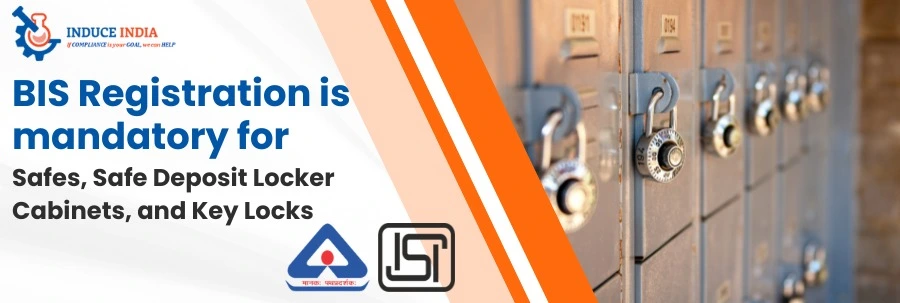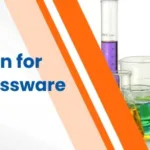In today’s fast-paced life, it is very important to protect your valuable assets and sensitive information. In this direction, the Bureau of Indian Standards plays an important role in certifying products that meet stringent safety standards and acts as a third-party assurance between customers and manufacturers. When it comes to safes, safe deposit locker cabinets, and key locks, BIS registration is mandatory for manufacturers or importers of these products.
In this blog we will talk about BIS Registration for safes, safe deposit locker cabinets and key locks, and why BIS Registration is important.
QCO for safes, safe deposit locker Cabinets, and Key Locks
Quality Control Orders (QCO) for safes, safe deposit locker cabinets, and key locks establish the mandatory requirements that products must meet to ensure reliability and security. Government-published QCOs to outline the specific parameters and standards necessary for products.
MINISTRY OF COMMERCE AND INDUSTRY (Department for Promotion of Industry and Internal Trade) has notified a Quality Control Order (QCO) on 8th December 2023 to make BIS registration mandatory for Safes, Safe Deposit Locker Cabinets, and Key Locks.
Download full QCO here.
Implementation Date of This QCO
According to this QCO, this Order may be called the Safe, Safe Deposit Locker Cabinets and Key Locks (Quality Control) Order, 2023.
It shall come into force on the expiry of 6 months from the date of publication of this notification in the Official Gazette.
The implementation date of this QCO is different based on the company scale. For large manufacturers or foreign manufacturers or importers it shall come into force on the expiry of 6 months from the date of publication of this QCO.
For small enterprises it shall come into force after 9 months from the date publication of this QCO and for micro enterprises it shall come into force on the expiry of 12 months from the date of publication of this QCO.
Manufacturers can check their company in Udyam Registration of company.
Compulsory use of Standard Mark (ISI Mark)
The BIS standard mark is a symbol of quality and reliability, signifying compliance with stringent safety standards set by the Bureau of Indian Standards. The compulsory use of the standard mark on safes, safe deposit locker cabinets, and key locks assures consumers of their durability and effectiveness in safeguarding valuable assets.
Manufacturers of these products must have BIS Certification, after implementation of the QCO. Without BIS Certification manufacturers or importers are not allowed to sell their products in the Indian market. As mentioned in QCO, if any person who contravenes the provision of this Order shall be punishable under the provisions of the Bureau of Indian Standards Act, 2016.
Product covered under QCO (IS Standards for Safes, Safe Deposit Locker Cabinets, and Key Locks)
| Goods or articles | Indian Standard | Title of Indian Standard |
| (1) | (2) | (3) |
| Safes, safe deposit locker cabinets and key locks | IS 550 (Part 1): 2014 | Safes |
| IS 5244: 2020 | Safe deposit locker cabinets | |
| IS 17566: 2021 | Key locks for security equipment |
Advantages of BIS Registration
BIS registration offers numerous advantages, both for manufacturers and consumers:
- Consumer Confidence: BIS certification instills confidence in consumers, assuring them that the products they purchase adhere to stringent safety standards.
- Market Credibility: Manufacturers benefit from enhanced market credibility by displaying the BIS standard mark, distinguishing their products as safe and reliable.
- Legal Compliance: BIS registration ensures compliance with regulatory requirements, mitigating the risk of legal ramifications and product recalls.
- Global Acceptance: BIS certification enhances the global acceptance of products, facilitating export opportunities and bolstering competitiveness in international markets.
Process for BIS Registration for safes, safe deposit locker Cabinets and Key Locks
The BIS Registration process is different for Domestic Manufacturers and Foreign Manufacturers as per their products. The process for BIS registration involves several key steps:
- Identification of Standard: Identification of the standard of product is the initial and important step for BIS Registration. All the further steps depend on this step.
- Preparation of Documents: Manufacturers must compile necessary documents, including product specifications, test reports, manufacturing process, etc.
- Application Submission: Submission of the application for BIS certification, along with the requisite fees, to the official website of the Bureau of Indian Standards.
- Sample Testing: In this step, samples are sent to the BIS recognised lab for testing.
- Audit by BIS Officers: Inspection of the manufacturing facility and testing facility to ensure compliance with quality control measures.
- Granting of Certification: When sample testing and audit is successful, BIS grants the license to the manufacturer.
Conclusion
By considering the use of safes, safe deposit locker cabinets, and key locks, the Bureau of Indian Standards has made BIS registration mandatory for these products. After BIS registration manufacturers can use the specified standard mark (ISI mark) on their products that show the product’s safety and reliability. BIS-certified products are preferred by customers in the market.
BIS Consultants in India
If you are looking for BIS registration whether you are from India or foreign, Induce India has offered comprehensive BIS consultancy services for more than 10 years. Induce India’s expertise in regulatory compliance and quality assurance, assists manufacturers or importers in navigating the certification process seamlessly from documentation to the grant of BIS license.
For more information about the QCO for laboratory glassware or BIS registration feel free to contact us at +91-7503304082 or email at [email protected].



